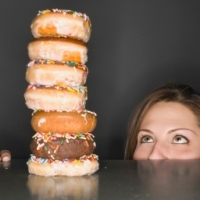Lose Weight > Weight Loss Tips > Weight Loss Articles > End Your Love Affair with the Scale: How to Break the Weighing Habit
End Your Love Affair with the Scale: How to Break the Weighing Habit
Weighing Yourself is a Lousy way to Tell if You're Losing Weight
The scale simply cannot tell the difference between muscle and fat, and while fat is bulky and lumpy, muscle is sleek and shapely. Muscle also gives you strength, agility and power. Muscle can be used as fuel, but it is not the primary fuel source. Fat on the other hand is a storage fuel for times of famine. It also shields our body's organs and provides a protective layer from the outside world. Without some body fat we cannot survive, and without some muscle you'd not have the strength to get out of bed. But while fat is necessary, many of us have a bit more saved up than is necessary. Most of us never consider our body's ratio of fat to muscle. We instead rely on the bathroom scale. We've been told we need to weigh a certain amount, or be within a certain range to the point that many who start eating well and exercising consistently abandon their plan when they don't quickly see a difference on the scale. Even when their body is visibly changing, they still are disappointed if the scale won't budge.
When the Scale Won't Budge
Consider for a moment, those first hints that something is changing: Your waistband may be getting looser, your rings may be slipping off, your face may start to look a little slimmer, and your shoes, yes your shoes will start to become too big for your feet. Many will start losing in the hands and feet first. That's just dandy, I know. We all strive for skinny fingers and toes, but I didn't design the body, I just own and operate one.
You may own and operate a car? Do you take care of it the same way you take care of yourself? Do you store gasoline in the trunk, in case you can't find a gas station? Probably not. Do you stockpile extra oil and batteries? No, no that either. Then why do you worry about dinner when you haven't finished eating lunch? Have you ever gone ahead and eaten something because you might get hungry later? Why do we worry so much about food when there is no scarcity that I've noticed? Where I live there is food at every corner, 24-hours a day, at the bank, the gas station and even the neighbor's garage sale.
Interestingly, I've found that when the scale suddenly showed a loss, greater than expected, it seemed to induce in me a desire to remedy that situation. I'd overeat that day and the next, somehow unraveling any good I'd done previously. Even with all the knowledge and sense in the world, we still become unsensible in the face of our judge and juror, the bathroom scale!
The problem isn't that we are unhappy by the number, so much as we are disappointed time after time. If you are dieting, then you want to see a lower number, but what happens when you do? Do you reward yourself for a job well done? Do you decide you've done so well, you might as well have a treat?
Measure Your Progress by Tracking Habits
Change the scale habit by finding other ways to measure your progress. Start a journal which gives you a way to chart what you do now so you can find ways to improve your habits. Ending a habit always involves beginning another.
Get a small notebook or journal. If later you want to get a nice leather book, fine, but don't start this exercise with the excuse that you don't have the supplies. Use a scrap of paper you found on the ground if you have to, but starting today, you are going to track something about every day, for one week.
Commit to one week, seven days. Yes, you can do this. If I can, you can. Seven days. Okay, to make it so easy anyone can do this, start with one day. Today you will chart only a few things: The time on the clock whenever you decide you're hungry, and what your hunger level is right then on a scale of 1 to 10 with one being absolutely stark raving mad with hunger and 10 being so full you think you'll burst. Obviously the happy place is somewhere between 3 and 5. Most people never experience a one or 10.
It's 7:30 AM and I'm a 3 - hungry, not starving, not going to come unglued if I don't eat, but yes, I'm hungry. You must decide the levels for yourself, but I'd suggest making an effort to wait until you are a 3 or lower to eat. Don't worry about it for now though. This week is just to make a chart and get used to keeping track of something instead of weighing yourself.
Track Hunger
Every day you successfully write down what time it is and your hunger level, you get a gold star, or a smiley face, or some other "fun" reward. Rewards should not be food, they should be nourishing to your soul instead. Some people like stickers, some like massages, whatever you like is fine. I like to reward myself with a massage once a month (I'd rather get one every day like Bob Hope, but that's another goal). Your goal is to achieve five or more smiley faces for the week. If you only manage two, is that bad? Heck, no. It's fantastic because it's an improvement over the week before. Next week make sure you at least achieve what you did the week before and possibly exceed it, and slowly, you'll develop a new habit. This works with exercise too, slowly adding minutes.
There's no need to keep track of what you're eating; this is just to get used to seeing how often you eat without hunger. It also helps if you tend to continue eating despite no longer being hungry. Both habits you can change.
When you make an effort to eat only if you're hungry, instead of every time the opportunity arrives or "it's time to eat," then you'll start losing inches, I guarantee it.
Inches lost, is what matters. I couldn't care less how much I weigh. What if my body was solid gold? It would weigh a lot and would I care? No. I'd feel pretty darn good about it, I'll bet. I'm worth my weight in gold, and so are you.
Related Articles
-
Turbulence Training - How Men Can Get In Shape Easily Without Cardio!
Turbulence Training - How Men Can Get In Shape Easily Without Cardio!
-
Does Evercleanse ever cleanse?
Does Evercleanse ever cleanse? Evercleanse seems to be a mystery weig
-
Fat Burning Furnace - Simple Diet Menu That Uses This 1 Single Method!
Learn How to Lose 26 Pounds in 7 Weeks! Simple Diet Menu That Uses Thi
-
Top Weight Loss Exercises - Gain A Perfect Body Figure
Weight loss is a long term process. People can not gain weight in one
-
The Easiest Way To Lose Weight - The Scientific Facts
Are you fed up of diets that are a real chore a
-
10 Superfoods for Weight Loss
Make
- DON'T MISS
- Herbal Fat Loss Products To Maintain Body Shape
- How to Lose Your Belly Fat in 2 Weeks - A Highly Effective & Proven Diet to Lose Belly Fat Incredibly Fast!
- Reduce Weight And Lose Body Fat Forever - 10 Commandments
- How Long To Lose Weight - Lose 30 In Thirty
- Best Cardio For Fat Loss
- Stop Wasting Time on Diets
- How to Lose Lower Tummy Fat in the Easiest Way Possible
- Weight Loss Pill - Apidexin Reviews
- Fat Loss Revealed Members-Are You One Yet?
- Every Other Day Diet - The #1 Diet for People Who Love Food!




